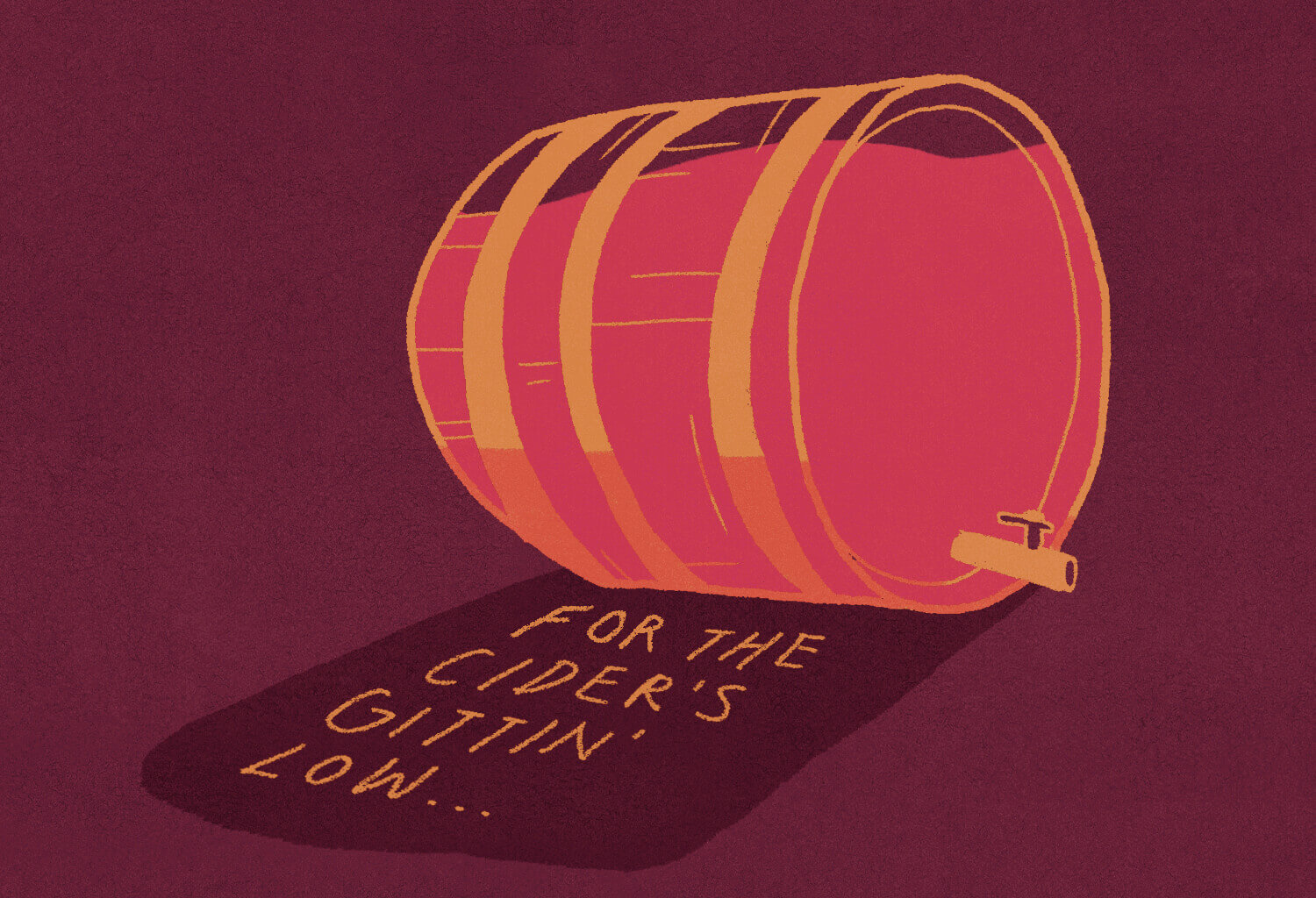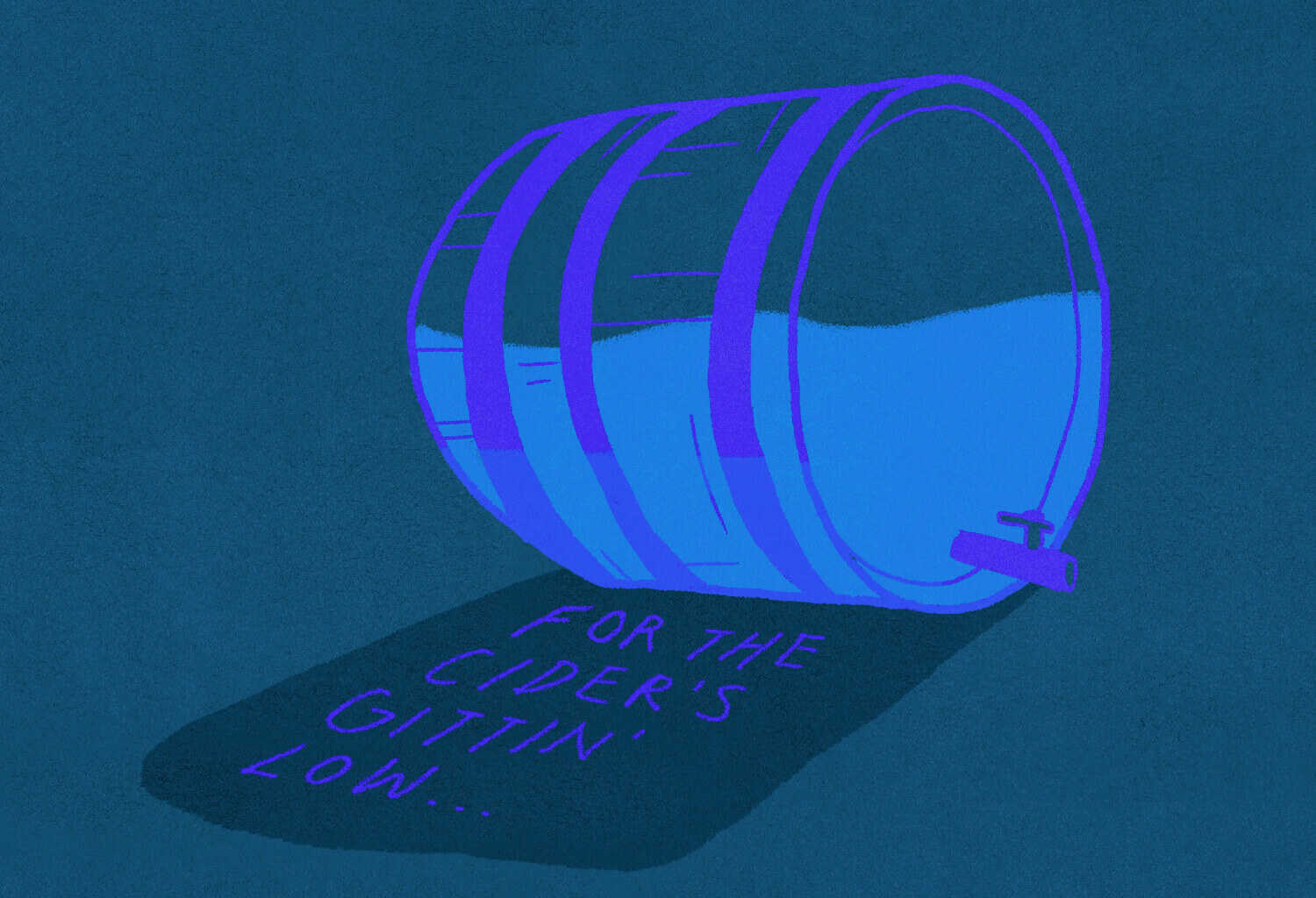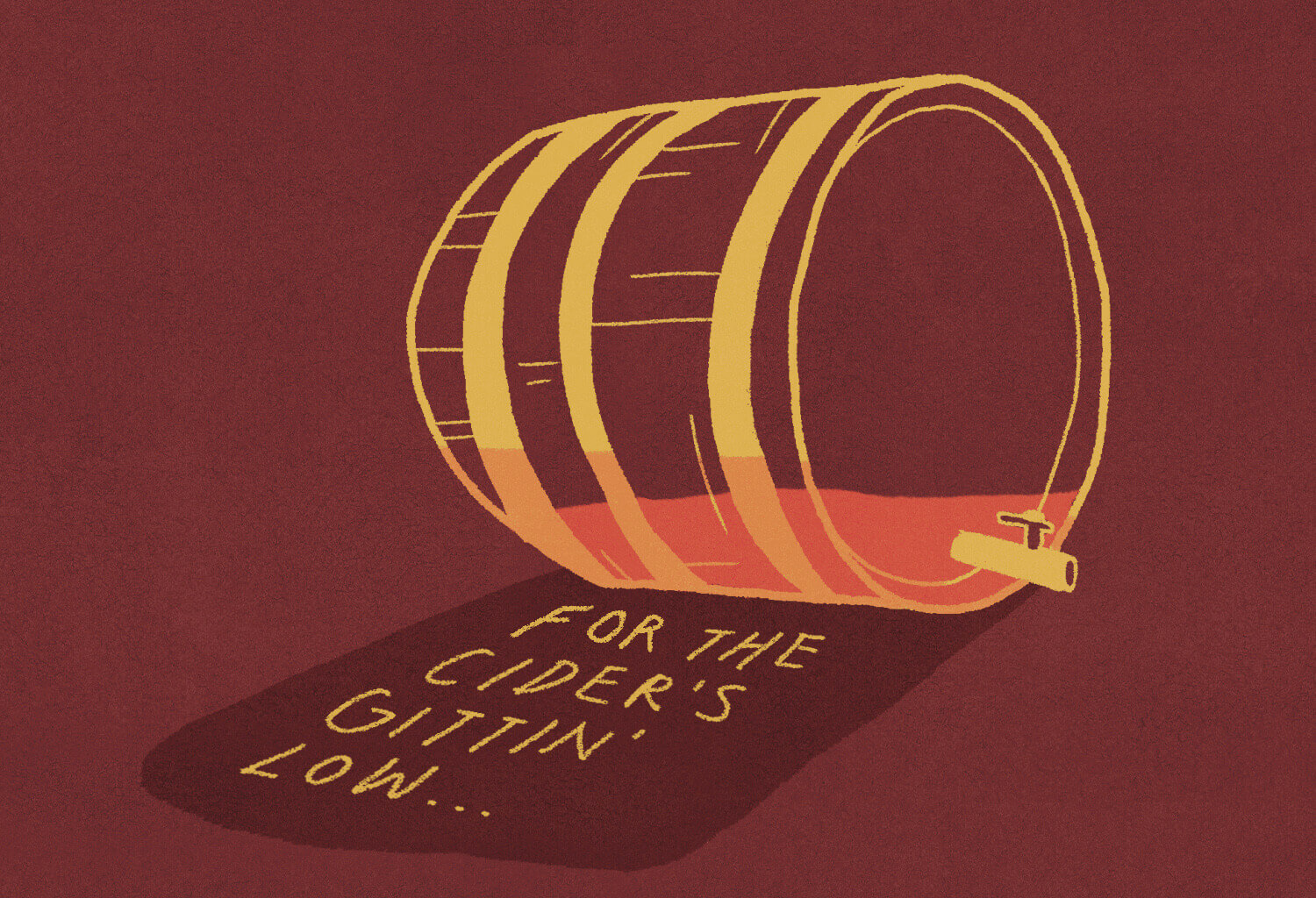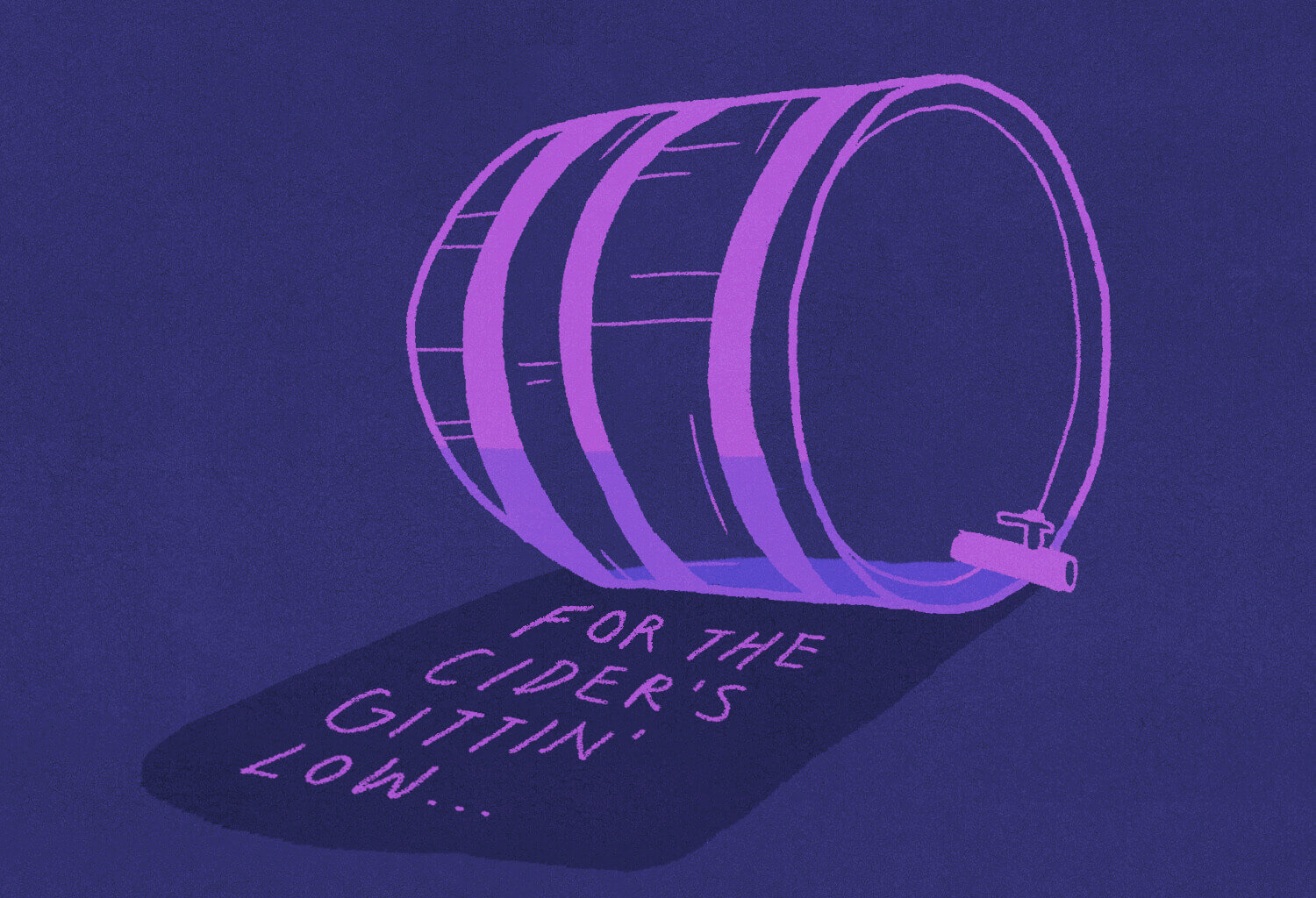This all started out of total panic.
Pure economic desperation. My job was in architecture, and I had no work because the housing market was in shambles. In 2009, our biggest investment was our home, and it plummeted in value, along with our life savings. So we stopped spending on all the things we could produce ourselves. Cider was one of the few things I lived for during those dark days. A glass of cider at the end of the day made all the difference. I love apples. I love orchards. I don’t like spending money. It’s simple. Concentrate on cider.
When we moved here to Wurtsboro, in upstate New York, we were surrounded by these old apple orchards, and seeing them on the road had this effect of bringing us back in time, discovering that history and the ghostly feeling of being part of it all. It was a great feeling.
I started to read about how to make cider and learn about the history and process. Ben Watson wrote a book called Cider, Hard and Sweet. I don’t retain what I read very well, teachers would agree, but he’s got a poem about cider written by an anonymous New England homesteader. He writes about going down to the basement and filling his pitcher. Back then there were wooden kegs. You’d tap them, fill a pitcher, and bring it up for dinner. This farmer worried about the cider from his keg running out, but he keeps going down to the basement to drink it. It’s an ominous poem.
When the farmer’s stock of fodder
He has placed within the barn,
When he’s gathered all the apples
And has placed them safe from harmWhen the butchering is over
Then the farmer feels so-so;
But he’s always sort of worried,
Fears the cider’s gittin low.

My first word was apple.
After church, as a kid, I remember our Sunday drives when we went to western Maryland, and there are apple farms, and for whatever reason the excitement of apples from either my parents or older sister got me talking. But no more apples for me until my twenties. I lived in a fishing shack on the Chesapeake Bay. It was on a 200-acre farm, in a protected area, with the bay on one side and an abandoned apple orchard on the other. I first experimented with whatever apples could do while I was living on the bay. I made pies. I made juice. I tried fermenting. I made beer even before that. I felt like I was in a different century, and I wanted to relive that fantasy.
He sees the signs of winter
In the breast-bone of the fowl;
And he fears a spell of weather,
For he’s heard a tooting owl.

I started my first years fermenting in the basement.
It’s the perfect temperature. Now I have a small pickup truck—an old Toyota. It has the turning radius of a jeep. You can get anywhere with it. You can go into the woods with it. It’s almost like a quad that way. But being a truck it’s got a big bed, and we can get twenty or twenty-five bushels in the back of it.
We shake the apples out. I use a tarp to catch them so they don’t get too screwed up on the way down. I have a five-gallon jug of water. Half of it I drink, the other half I use to wash my arms after I’ve been rubbing against poison ivy. It’s inevitable I’m going to get poison ivy during these foraging missions.
We pick up the apples off the ground, load them into the truck, and bring them home. If the apples are too mangled we have to work with them immediately: grinding them and pressing them. Ideally, I’d like to put them in storage and see if they improve, which can happen. A lot of the late apples, like Golden Russet, improve with some storage if the apple isn’t bruised or cut.
The next day or, if we have time, that night, we’ll grind the fruit. I like to macerate it. You just let it sit on its skins a little bit. I have a lot of voodoo thoughts on why that’s good. I believe that the tannin and flavor is in the outer surfaces of the apple. To maximize the extraction of those good ‘dry layers’ it’s important to grind the apple to allow the juice to penetrate into those newly broken surfaces. The aroma of the skin meshes with the juice, and after a day I press the mush and hope that the dry properties of the apple are now embedded.
Scientists and wine nerds disagree with me. Sometimes one can’t see the forest through the trees, but I contend it is they who are lost in the woods. They fear, among other things, that by macerating the apples the fruit pectin is released and a gelatinous layer will form in the wine. I’ve experienced that on occasion, but sometimes you have to lose the battle to win the war. Cosmetic issues are for marketers and customers to resolve. Good wine is good wine.
As he fills the yawning wood-box
He remarks, ‘It’s going to snow.’
Then he says, ‘We must be keerful,
For the cider’s gittin low.’

This house is from the 1840s.
It’s along an abandoned canal that was dug to connect the Hudson and Delaware rivers. There’s a dry canal and towpath you can still walk along. There are no houses down there, but what you can find are apple trees. I believe the history of a place is always there, despite being invisible and rarely considered. Place cannot be mass-produced.
Luckily my farm still looks like a homestead, so it’s hard for me to forget that I’m representing not only my vision of cider but also the place from which the cider emerges. On occasion I pause and feel the presence of the people and animals that have lived here before. I don’t know how to describe it other than a ghost, but there’s some sort of spirit that hangs over this place and the apples that fuels me. It keeps me honest. It makes me feel like what I’m doing is what I should be doing.
So throughout the Winter season
And a part-way through the Spring
The farmer feeds the cattle,
And doesn’t say a thing.But when he sees us drinking,
With his face expressing woe,
He remarks, while helping mother,
That the cider’s gittin low.

You don’t want to tell a cider what to do.
You don’t want to tell it how it should taste. You want to let it express itself. I think what nature wants to say is infinitely more interesting than what humans want to say. Nature doesn’t abide by our concept of what we want. We might have this idea for justice, this idea that we love this little rabbit out there eating a clover. Then all of a sudden a hawk swoops down and you’re outraged. Humans are outraged. Nature goes by different rules.
We grow our own trees. We take the apple pomace from having pressed out the juice and put it out in a pit. Seedlings come up, and then we transfer those seedlings to a nursery. After a year or two we transfer that out to the woods and that will be its own apple variety. It’s all about finding the apples that are already perfectly at home in your area. Planting actual trees and letting them grow up ungrafted. That’s how it was and that’s how I think it should be again.
When the cold and snapping breezes
Bend the sere and leafless trees,
When a pile of feathery snowflakes
Is the most a farmer sees.
Then he comes in from the tavern,
And he whispers rather slow,
‘Goin to be a freezin’ winter,
and the cider’s gittin low.’
For years I forgot all about the poem, until I started in the basement. One night, Polly, my wife, said, ‘We need cider for dinner.’ This was winter and I went down to get a growler. I brushed the snow off the bulkhead doors, turned on the light, and picked out the cider. As I was walking back up the steps, I was holding the growlers. Then, all of a sudden, I had this spooky, ghostly feeling that I was the guy from the cider poem. I felt possessed. That guy took over me.
This article originally appeared in True Ink‘s home brewing Almanac. Participate in a raffle to win tickets to pick apples with cider master Andy Brennan.
More from True Ink’s on home brewing:
More Must-Reads From TIME
- The 100 Most Influential People of 2024
- Coco Gauff Is Playing for Herself Now
- Scenes From Pro-Palestinian Encampments Across U.S. Universities
- 6 Compliments That Land Every Time
- If You're Dating Right Now , You're Brave: Column
- The AI That Could Heal a Divided Internet
- Fallout Is a Brilliant Model for the Future of Video Game Adaptations
- Want Weekly Recs on What to Watch, Read, and More? Sign Up for Worth Your Time
Contact us at letters@time.com